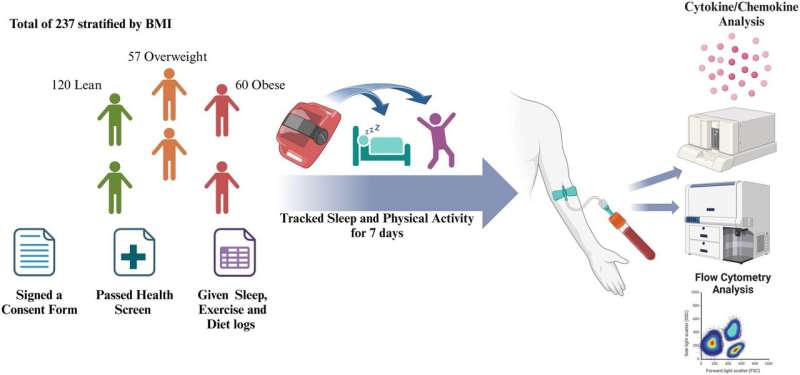This article has been reviewed according to Science X's editorial process and policies. Editors have highlighted the following attributes while ensuring the content's credibility:
fact-checked
peer-reviewed publication
proofread
Even one night of lost sleep can alter your immune system, increase inflammation

New research reveals insight into the impact sleep quality has on a person's immune system, and how it could be linked to the development of diseases such as obesity, diabetes, and cardiovascular diseases.
The study, published in The Journal of Immunology, found that even a single night of 24-hour sleep deprivation in young, lean, and healthy individuals altered the profile of immune cells that help regulate the immune system to resemble that of individuals with obesity—a condition known to drive chronic inflammation. This suggests that the immune system is highly sensitive to sleep and may adapt rapidly to changes in sleep pattern. According to the researchers, if these shifts persist, they could contribute to long-term inflammatory states and increase the risk of disease.
Substantial evidence exists linking sleep disorders and disturbances to an array of chronic conditions and morbidities, such as type 2 diabetes and cardiovascular diseases. It's also known that poor health outcomes can be driven by chronic inflammation but the direct influence of sleep on circulating immune cells, such as monocytes, is not as well understood.
Monocytes are a vital component of the innate immune system—the body's first line of defense that rapidly detects pathogens and kickstarts the immune response. There are three subsets of monocytes—classical, intermediate and non-classical monocytes. Non-classical monocytes patrol the body, sense and respond to inflammatory cues, and help to maintain and regulate the immune response.
In this study, the researchers from the Dasman Diabetes Institute, Kuwait City, Kuwait, analyzed the sleep patterns of 237 healthy adult participants of varying BMI, and took blood samples to profile the levels of different monocytes as well as markers of inflammation. They found that obese individuals had significantly lower sleep quality and higher chronic low-grade inflammation compared to the lean group. Non-classical monocytes were also increased significantly in obese participants, correlating with reduced sleep quality and elevated pro-inflammatory markers.
Five healthy, lean individuals also took part in a 24-hour sleep deprivation part of the study and had blood samples collected throughout. The researchers found that sleep deprivation altered the profile of monocytes like what was seen in obese participants, supporting the role of sleep health in modulating inflammation.
Dr. Fatema Al-Rashed, who led the study, said, "Our findings underscore a growing public health challenge. Advancements in technology, prolonged screen time, and shifting societal norms are increasingly disruptive to regular sleeping hours. This disruption in sleep has profound implications for immune health and overall well-being."
The researchers next want to explore in greater detail the mechanisms linking sleep deprivation to immune changes. They also want to find out if interventions such as structured sleep therapies or technology-use guidelines can reverse these immune alterations.
"In the long term, we aim for this research to drive policies and strategies that recognize the critical role of sleep in public health. We envision workplace reforms and educational campaigns promoting better sleep practices, particularly for populations at risk of sleep disruption due to technological and occupational demands. Ultimately, this could help mitigate the burden of inflammatory diseases like obesity, diabetes, and cardiovascular diseases," said Dr. Al-Rashed.
More information: Fatema Al-Rashed et al, Impact of sleep deprivation on monocyte subclasses and function, The Journal of Immunology (2025). DOI: 10.1093/jimmun/vkae016




















